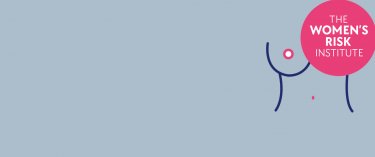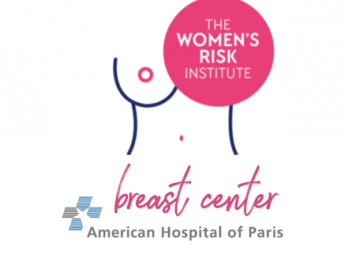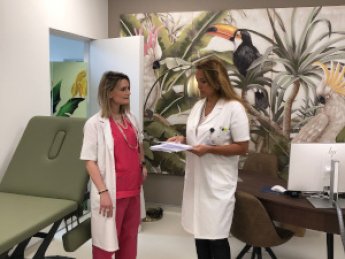
The Women’s Risk Institute
An assessment at the Women’s Risk Institute
The aim of the Women’s Risk Institute is to evaluate each woman’s personal risk of developing breast cancer, and propose the appropriate monitoring combined with targeted prevention. Foreseeing the need for medical oncology to evolve, the Women’s Risk Institute at the American Hospital of Paris analyzes each woman’s personal, family, radiological and genetic data as part of its personalized monitoring and prevention program dedicated to women.
Why undergo an assessment at the Women’s Risk Institute?
-
1
Identify your personal risk of developing breast cancer over the next five years
-
2
Participate in very early customized screening and a prevention plan designed to match your risk factors
-
3
Receive a referral for a genetic consultation, if necessary
The assessment is based on:
-
Questionnaires
- A questionnaire to gather personal and family data concerning your breast cancer risk factors
-
Exams
- A mammogram with standardized evaluation of breast density by DenSeeMammo™
- DNA analysis on a saliva sample to identify the genetic polymorphisms associated to breast cancer (result integrated into theevaluation of risk)
- A mammogram with standardized evaluation of breast density by DenSeeMammo™
-
Medical consultations by breast cancer specialists
- A consultation with a radiologist specialized in breast imaging
- An algorithm derived through artificial intelligence (MammoRisk™) which evaluates each woman’s personal risk based on her genetic makeup, personal history and breast density
- A concluding consultation with a breast cancer specialist
- A consultation with a radiologist specialized in breast imaging
Following your assessment
You will receive a personalized monitoring and prevention plan.
Even if more than one breast cance r risk factors are identified during your check-up, this doesn’t mean you will develop the disease.
- You will receive a personalized estimate of your risk of developing breast cancer over the next five years
- Together with you, we define a customized regimen of clinical and imaging based monitoring, which we can fully plan for you if you wish
- We suggest a personalized prevention plan for you
- We advise you in terms of birth control and menopause hormone replacement therapy, based on your risk profile
- We guide you towards the appropriate oncogenetic care if a potential risk factor based on family history is identified
The Women’s Risk Institute:
- Does not replace mass organized screening initiatives
- Does not offer post-therapeutic monitoring for patients who have already been treated for cancer
The entire check-up lasts approximately two hours and takes place entirely at the American Hospital of Paris. To obtain further information or schedule an appointment:
Women’s Risk Institute au Check up Center
Direct line: + 33 (0) 1 46 41 27 38
Email: edscom@ahparis.org
Breast Center
Direct line: + 33 (0) 1 46 41 82 49
Email: contact.breastcenter@ahparis.org
t
What are the main risk factors for breast cancer?
Cancer never results from any single cause. The disease develops in the presence of several factors, which often interact with each other.
- Age
The risk of breast cancer increases with age. It is the leading risk factor for breast cancer.
- Family antecedents and genetic factors
If one or more family members have had breast cancer, this is an important risk factor, especially if the cancer was diagnosed at a young age. 20 to 30 percent of breast cancers develop in women with several cases of breast cancer among family members – mother, sister, grandmother or, in rare cases, brother or father, as men can also develop breast cancer.
Genetic mutations: Through our partnership with Institut Curie, a genetic consultation may be proposed to women or families with a potential genetic risk of breast cancer.
- Benign breast disorders
Benign breast disorders are non-cancerous conditions affecting the breast. Certain lesions such as cysts occur frequently but do not increase the risk of breast cancer. Other benign lesions, such as papillomas, may increase the risk of breast cancer and require close monitoring.
- Breast density
Breast x-rays allow the radiologist to determine the density of a woman’s breasts. Breast density has nothing to do with the size, appearance or consistency of the breasts. Rather, it refers to the amount of fatty tissue. The fattier the breast tissue, the lower the density rate. Breast density varies with age.
Women with high breast density have a greater risk of developing breast cancer. Those with the highest density rates have a four to six times higher risk of developing breast cancer during their lives than women whose breasts are almost entirely made up of fatty tissue.
- Secondary breast cancer risk factors
Other parameters have been identified as breast cancer risk factors or protective factors, even though they play a lesser role in predicting breast cancer: alcohol consumption, excess weight and obesity (after menopause), oral contraception (birth control pill), post-menopausal hormone replacement therapy, age at first period, age when first child was born, age at menopause, number of children, duration of breastfeeding and exercise.
Évaluaion du risque de cancer du sein Vers un dépistage personnalisé ? - Gynécologie Obstétrique Pratique - n°348 - OCTOBRE 2022
PDF - 463.1 KB DownloadFaisabilité du dépistage et de la prévention personnalisés - Recommandations à travers l'évaluation individuelle du risque de développer un cancer du sein
PDF - 1.06 MB Download

